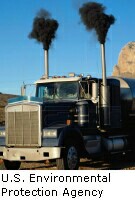
MONDAY, Dec. 7 (HealthDay News) — U.S. environmental officials said Monday that greenhouse gases such as carbon dioxide endanger people’s health.
The so-called endangerment finding was announced by Lisa P. Jackson, the administrator of the U.S. Environmental Protection Agency at an afternoon press conference. It could signal a possible first step by the EPA to regulate greenhouse gases under the Clean Air Act. But Jackson said the agency would prefer that Congress pass legislation that would limit production of the pollutants.
“The scientific community, the business community and the policy world have spent decades studying greenhouse gas pollution and climate change,” Jackson said, adding that there have been alarming increases in the amount of greenhouse gases over the years.
“That increase is deteriorating the natural balance in our atmosphere and changing our climate — the threat is real,” she said.
This finding means the Obama administration is prepared to act to limit global warming without Congressional support.
The finding is also noteworthy as the United States prepares to take part in a 192-nation climate conference that began Monday in Copenhagen, Denmark. In the past, the United States has been criticized for dragging its feet on efforts to combat global warming.
The endangerment finding means that “we arrive at the climate talks in Copenhagen with a clear demonstration of our commitment to facing this global challenge,” Jackson said.
Previous research has linked air pollution to a variety of diseases, including heart disease, cancer and asthma.
In announcing the finding Monday, Jackson did not specifically state what diseases can be caused by greenhouse gases, which are largely produced by factories, power plants and motor vehicles that burn fossil fuels such as oil and coal.
Environmental groups applauded Monday’s EPA announcement.
“As the major global warming summit begins this week in Copenhagen, this announcement couldn’t come at a more important time,” Carl Pope, executive director of the Sierra Club, said in a prepared statement. “The Obama administration has followed through on its pledge to act and is demonstrating that the U.S. has turned away from eight years of inaction under the Bush administration,” he stated.
“This is one more key commitment President Obama can bring to the world to show that the U.S. will do its part to fight global warming,” Pope said.
The endangerment finding comes after a 2007 U.S. Supreme Court ruling that said such a finding was necessary before the EPA could use the federal Clean Air Act to regulate carbon dioxide and five other greenhouse gases from power plants, factories and automobiles, Jackson said.
Jackson noted that a similar finding was sent to the Bush White House, but was never acted upon.
“This administration will not ignore science or the law any longer, nor will we avoid the responsibility we owe to our children and grandchildren,” she said.
In April the EPA started taking public comments about global warming, a sign that the agency was moving to a view that greenhouse gases pose a health threat.
While environmental groups support the new finding, some business groups, such as the U.S. Chamber of Commerce, have been opposed to using the Clean Air Act to regulate greenhouse gases. The chamber said in a statement that “the endangerment declaration could spark a cascade of litigation and regulation that could harm the economy.”
According to the EPA, regulation of greenhouse gases will not begin immediately. The administration’s preference is that Congress take the lead in passing a cap on carbon dioxide and other greenhouse gases, Jackson said.
Jackson said she was hopeful that Congress would pass a greenhouse gas emissions bill that the president could sign.
Under a separate action, the EPA has begun requiring large producers of greenhouse gases to start reporting the amount of these gases they release into the environment. This will allow the EPA to track greenhouse gas emissions, Jackson said.
In another effort to limit greenhouse gases, the Obama administration, under the Clean Cars Program, will mandate that average automobile mileage increase to 35 miles per gallon by 2016, Jackson said.
More information
For more on greenhouse gases, visit the U.S. Environmental Protection Agency.

